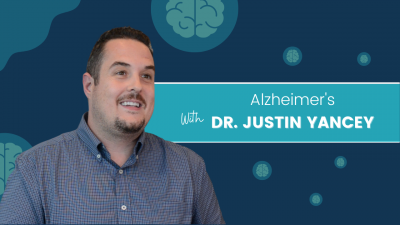
Alzheimer's disease disturbs cognitive abilities and makes simple tasks difficult.
We interviewed SIMEDHealth Neurologist, Dr. Justin Yancey, to get the facts about Alzheimer’s Disease. Alzheimer’s is a progressive brain disease affecting behavior, thinking, and memory[1].
If you cannot view this video, click here.
What are the main indicators for someone who might be developing Alzheimer’s disease?
- Forgetting important dates and appointments
- Repeating stories
- Asking the same questions
- Relying on memory aids, like writing things down on sticky notes
- Common tasks become difficult, like remembering what to get from the grocery store
- Getting lost while driving the same route
- Misplacing items like keys
- Difficulty word-finding during conversations
Can someone be prone to Alzheimer’s based on genetics, environment or lifestyle?
“Yes, although complex, it’s usually a combination of all three” said Dr. Yancey. “The biggest factor is age, the risk doubles every five years after the age of sixty-five. There is a small increased risk for those who’ve had family members diagnosed with Alzheimer’s. However, there are some risk factors you can manage to lower your risk, such as high blood pressure, diabetes, smoking, previous strokes, and history of head injuries. “
Are there ways to prevent Alzheimer’s?
”Living a healthy lifestyle, mentally and physically can lower the risk of Alzheimer’s, as well as maintaining a social life and interacting with friends and family.” “Control your risk factors,” Dr. Yancey continued, “eat a healthy diet, get enough sleep, and avoid heavy alcohol use. Some studies have shown the Mediterranean diet might be helpful. This is a diet high in fruits, vegetables, whole grains, and healthy fats.”
If one develops Alzheimer’s, what can they do?
“There’s no cure for Alzheimer’s, but there are ways to help someone suffering from the disease” Dr. Yancey reported “Some helpful things include reviewing finances, legal issues, driving, daily care, bathing, dressing, future planning and looking into long term care options. As the disease progresses, patients will begin wondering and leaving their home, so looking out for their safety can also help.”
If you or loved ones notice new changes in memory, speak to your primary care doctor or see a neurologist. You’re not alone, there’s testing and medications that can help.
[1] What is Alzheimer’s disease? , Alzheimer’s Association